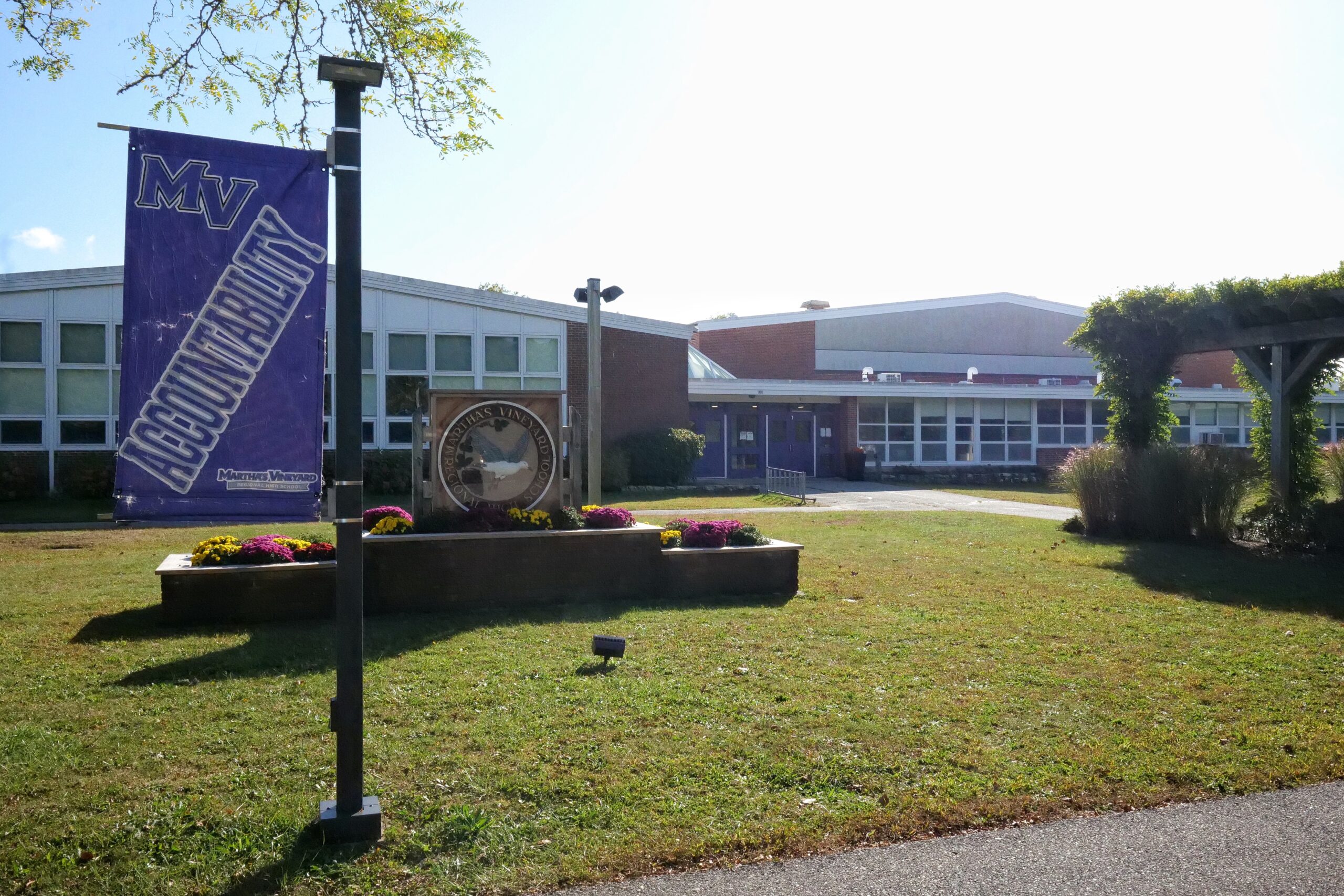Following a contentious discussion on Monday evening, the Martha’s Vineyard Regional High School Committee decided to forgo traditional town meetings and instead move forward with an Island-wide vote to fund the renovation and addition project for the regional high school.
The committee convened in the school library to determine which voting process to pursue. Previously, the vote had been postponed from early October, allowing members time to consult with town officials, residents from all six towns, and each other to ensure the best path forward.
“I understand that there’s a lot of trepidation and concern. But I see confidence in our ability to take this vote tonight,” committee member Robert Lionette told the room, which included about a dozen attendees from local town officials to fellow school committee members. He noted the committee had evolved and thoroughly considered the decision. “Because of that, I am fully supportive of one, Island-wide vote,” Lionette affirmed.
### The Voting Options
Two options were on the table for how the Island community would vote on the project:
1. **Traditional Town Meetings:** Residents of each of the six towns would vote individually. However, if even one town rejected the project, the committee would need to return to the Massachusetts School Building Authority (MSBA)—the funding body that offers roughly a 30 percent reimbursement on the project cost, which is currently projected at about $334 million. There are no guarantees that MSBA would continue funding if the project was initially voted down in this manner.
2. **Island-wide Vote:** Residents would vote at their respective polling locations with a simple “yes” or “no” ballot on funding the project. Since the project cost will ultimately be distributed among individual taxpayers, approval rests in the hands of the entire Island public.
Committee member Amy Houghton expressed strong support for the Island-wide vote. “There’s no removing the community’s input,” she assured attendees. Houghton shared that some Tisbury residents prefer this method after their own school building project lost approximately $30 million in MSBA reimbursement due to dissenting town voters in the past. “This is a regional school district, and we need to be able to support the school and move the project forward,” she said.
### Concerns and Opposition
Only one committee member, chair Skipper Manter, voted against the Island-wide vote. Manter voiced his belief in the traditional town meeting structure and worried about potential fallout among the towns. “I think, in small town government, there’s nothing more important than town meetings. Everybody gets a fair opportunity to express their views,” he said.
Public opposition to the Island-wide vote echoed Manter’s concerns during the meeting. Richie Smith, superintendent of all public schools on the Island, expressed unease about bypassing town meetings. “I think we need to work within the confines of what we’ve done in a traditional manner,” Smith remarked.
He emphasized the necessity of the renovation beyond simple code upgrades—such as mechanical, central air, and electrical system improvements—that alone would cost about $190 million. The planned renovation and addition are vital for the wellbeing of staff and students, Smith said, and urged the committee to focus on educating the public about the project’s importance to ensure affirmative votes, rather than changing the voting system.
Dion Alley, chair of the school building committee, shared a similar viewpoint: “I would strongly urge you to follow the path we’ve been on. I think you need to put your trust in the community, and I think the community nine out of ten times will do the right thing.”
### Voices from the Towns
Several town officials were present to weigh in on the issue. Chilmark Select Board Chair Marie Larsen voiced support for a town meeting vote. “Doing the nuclear option right off the bat is just not a good thing in my opinion,” Larsen said. “We need to get the Island behind this, and this [choosing the Island-wide vote] is the opposite of that.”
Rachel Orr, a member of Tisbury’s finance and climate committees, expressed ongoing concerns about fairness within the funding formula under an Island-wide vote. With towns paying different rates, she questioned the equity of a regional vote. Tisbury residents and officials have been vocal for months about this issue, as the town is slated to contribute more than others under the current system.
While school committee members noted that the regional agreement and funding formula had previously been approved by Tisbury officials, the reality remains that Tisbury residents face multiple capital project burdens and fear adding another financial strain.
“I had three children go through the school. I’m very grateful for the facility and I love that it’s an Island-wide institution. But there are real winners and losers here,” Orr commented.
### Final Thoughts from Committee Members
School committee member Kathryn Shertzer admitted she had struggled with the decision for months. “There are no guarantees about this project. I really hope this project moves forward regardless of the way it’s voted,” she said.
Citing the Tisbury School project, where MSBA funding fell through and residents paid significantly higher taxes than planned, Shertzer expressed caution. “I can’t fathom our Island making repeated mistakes,” she said before ultimately voting in favor of the Island-wide vote.
—
As the project moves ahead with an Island-wide vote, the community awaits a decision on a renovation that has been in the works for about a decade, balancing regional interests with individual town concerns and the vital goal of upgrading a critical educational facility.
https://www.mvtimes.com/2025/11/03/island-wide-vote-chosen-school-building-project/

Be First to Comment